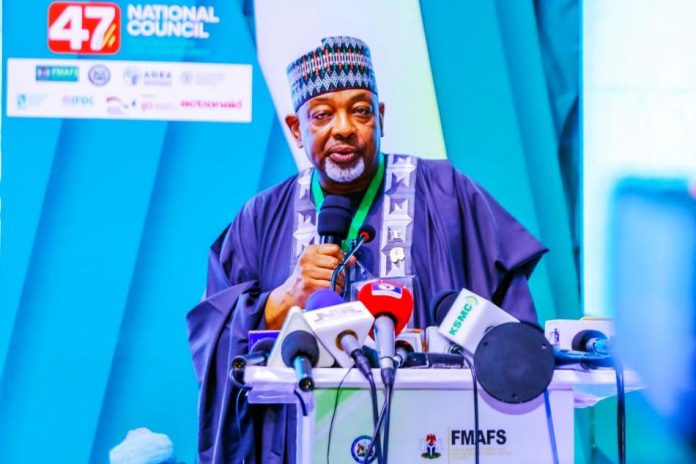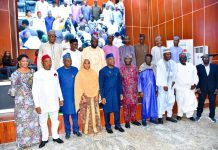
The Federal Government has said that the recent declines recorded in the prices of key food commodities across the country are the result of targeted market interventions, increased production, and sustainable investment in the agricultural ecosystem.
The Minister of Agriculture and Food Security, Sen. Abubakar Kyari revealed this during the 47th Regular Meeting of the National Council on Agriculture and Food Security held in Kaduna on Thursday, 6th November 2025.
He said that the ongoing reforms under President Bola Ahmed Tinubu’s administration are driven by commitment to achieve food sovereignty, ensuring that Nigeria would produces what it consumes, while guaranteeing accessibility, availability and affordability for households.
In his words, “As we continue along this path, we are already beginning to witness a decline in food prices across several commodities, a reflection of ongoing targeted market interventions. While we are not yet where we want to be, this positive trend confirms that we are moving in the right direction.”
The Minister added that “the first step toward food sovereignty is ensuring consistent, high-yield production through timely access to quality and affordable inputs. Guided by this, the Ministry, in collaboration with the African Development Bank and State Governments, has strengthened the National Agricultural Growth Scheme-Agro-Pocket (NAGS-AP) as Nigeria’s flagship programme for input delivery and productivity expansion”.
He noted that,”Through this programme, wheat production has continued to expand across the country, growing from 15 participating states in the 2023/2024 dry season to broader coverage in the 2024/2025 season.
The increase in scale reflects our ongoing efforts to enhance production capacity and boost self-sufficiency in key staples.”
“Just last month, in October, a new milestone was achieved with the introduction of rainfed wheat cultivation in Kuru, Plateau State, an innovation by the Lake Chad Research Institute (LCRI) that extends wheat farming beyond irrigated zones.
With rainfed varieties now proven viable across the highlands of Plateau, Taraba, and Cross River States, Nigeria is charting a new course toward all-year farming and self-sufficiency in wheat production, bringing us closer to meeting our national demand from within”, Kyari stated.
“As we scale up production, we must also preserve value after harvest. To address post-harvest losses and stabilise prices, the Federal Ministry of Agriculture and Food Security, in collaboration with the Alliance for a Green Revolution in Africa (AGRA), has developed the Nigeria Postharvest Systems Transformation Programme (NiPHaST), our Legacy Project unveiled in Dakar, Senegal earlier this year during the Africa Food Systems Forum (AFSF)” the Minister emphasized.
He also stated that investments in drought-tolerant crop varieties, integrated pest management, and the Nigerian Farmers’ Soil Health Scheme, which tailors fertiliser use to specific soil conditions.
Kyari further announced that the Bank of Agriculture has been approved for N1.5 trillion recapitalisation and an additional N250 billion financing window for smallholder farmers.
In partnership with Heifer Nigeria, a national agricultural mechanisation programme has been launched to support youth- and women-led mechanisation service centres in all six geopolitical zones.
“Mechanisation will become a national service that modernises production, raises yields, and creates sustainable rural employment,” the Minister noted.
In his remarks, Minister of State for Agriculture and Food Security, Sen. Dr Aliyu Sabi Abdullahi emphasized the adoption of climate-smart agriculture to achieve long-term productivity.
“We must adopt climate-smart practices that increase crop yields while building resilience.”
He highlighted flagship initiatives, including the 500,000-hectare Dry Season Farming Scheme, renewable energy-powered water projects for irrigation, and household food production through the Every Home a Garden initiative championed by the First Lady, Senator Oluremi Tinubu.
The ministers noted that Nigeria holds the largest agricultural production potentials in West Africa and is strategically positioned to become a leading food supplier to the region.
In his remarks, while declaring the Council Meeting Open , His Excellency, the Executive Governor of Kaduna State, Sen. Uba Sani said, “This year’s session unfolds at a defining moment in our collective journey, one in which the very notion of food security has transcended policy and entered the realm of national survival.”
According to him, “We face a dual imperative: to secure the food that nourishes our people and to build an agricultural economy that sustains our prosperity. Across the globe, the food systems of tomorrow are being shaped by innovation, resilience, and inclusivity.”
The governor pointed out that under the Renewed Hope Agenda, our nation is embracing that transformation. Guided by the visionary leadership of President Bola Ahmed Tinubu, GCFR, the Federal Government has repositioned agriculture at the centre of Nigeria’s economic architecture, through mechanization, value-chain integration, improved input systems, and the modernization of rural infrastructure.
“These are not isolated policies; they are the scaffolding of a new era of shared growth and self-reliance.”
He noted that in Kaduna State, “we have placed this national vision at the heart of our governance agenda. Agriculture, to us, is not merely a sector: it is a moral and economic imperative. It is the foundation of rural transformation, the engine of inclusive development, and the bridge that connects aspiration to opportunity. “
“We have pursued deliberate, evidence-driven interventions that empower both the smallholder who tills a single hectare and the commercial farmer who drives industrial-scale production.
We are expanding access to credit, improving input delivery, modernizing logistics, and nurturing a fertile ecosystem for agribusiness to thrive, “he added.
Earlier, the Hon. Ministers, Permanent Secretary, the Ministry’s officials and Stakeholders paid a field visits to De-Branch Farmers, the Afrexim Bank Quality Assurance Centre currently under construction, Olam Agri, Tomato Jos, and TMDK Agro Park, where there were impressive examples of innovation, value addition, and rural job creation shaping Kaduna’s agricultural transformation.
Highlight of the event was the presentation of awards and recognition to outstanding farmers and agricultural stakeholders.
Signed
Eremah Antonia
Chief Information Officer
For: Head, Department of Information
6/11/2025





